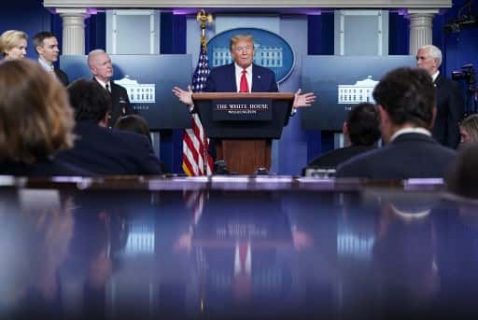
By Michael Mathes with AFP bureaus
WASHINGTON, DC (AFP) — Donald Trump vowed to temporarily ban immigration to the United States to combat the “invisible enemy” of the coronavirus, as the pandemic threatens to push the global economy into freefall.
The president’s late-night Tweet was scant on details but suggested a hardening of his anti-immigration crusade, a move likely to delight Trump’s supporters ahead of November elections.
The threat came as the death toll from the virus surpassed 170,000 worldwide, sending economies into a tailspin as governments anxiously try to chart a path out of the crisis.
Freezes on whole sectors of commerce are playing out dramatically on oil markets, where shrinking energy demand and a supply glut have crashed prices.
In hard-hit Europe, some countries are cautiously creeping out from confinement to soften the economic costs, though large gatherings appear to be out of the question for the forseeable future.
While Germany is allowing smaller shops to reopen, authorities cancelled Oktoberfest, a beloved beer-swilling festival in southern Bavaria, for the first time since World War II.
Spain also announced it was scrapping its annual bull-running festival in Pamplona, a centuries-old tradition that normally draws hundreds of thousands.
The US is now home to the world’s deadliest outbreak, with more than 42,000 people killed and 784,000 infected nationwide.
As the downturn starts to bite, President Trump has stoked conflict with Democratic state governors by lending to support to a spate of anti-lockdown protests.
He also drew criticism with his vague announcement to temporarily halt immigration to the country, claiming it would save American jobs — some 22 million of which have vanished in the wake of the virus.
“In light of the attack from the Invisible Enemy, as well as the need to protect the jobs of our GREAT American Citizens, I will be signing an Executive Order to temporarily suspend immigration into the United States!” he tweeted.
The White House did not provide any further details about the measure or how long it would last.
California Democratic Senator Kamala Harris shot back, accusing Trump of “shamelessly politicizing this pandemic to double down on his anti-immigrant agenda.”
– Fear lingers in Wuhan –
Debates are raging worldwide over when and how to relax clampdowns on business and ordinary life.
Many governments fear triggering another wave of infections but are also worried about the mounting economic costs and signs of social tension.
In Europe, several countries including Germany, Austria, Norway and Denmark have begun to relax restrictions while still calling for the public to practice social distancing.
Italy’s Prime Minister Giuseppe Conte has also promised to soon unveil a plane to start reopening the hard-hit country.
In a sign of what lies ahead, the gradual awakening of Wuhan, the Chinese city where the virus first emerged, remains tinged with fear about fresh outbreaks of the disease.
The industrial city was released from quarantine two weeks ago, but many restaurants, for instance, have not reopened or are still only able to offer outdoor seating and takeout.
“We have very, very few customers,” said Han, the 27-year-old owner of a soy drink stall.
“Everyone is worried about asymptomatic infected people,” she said. “Business is just not as good as before.”
Singapore, meanwhile, has become a sober example of how infections may ebb and flow, with the financial hub extending lockdown measures Tuesday as it battles a second wave of contagion.
“Many will be disappointed by the extension,” Prime Minister Lee Hsien Loong said, acknowledging that businesses and workers were “hurting greatly”.
– Hunger, abuse –
Elsewhere, there is fear over how the most vulnerable will survive lockdowns that breed their own dangers.
The number of people around the world suffering from acute hunger could nearly double to 265 million this year due to the economic impact of the pandemic, the UN’s World Food Programme warned.
The virus is “potentially catastrophic for millions who are already hanging by a thread,” the WFP’s Senior Economist Arif Husain said in a statement.
In many parts of the world, including Latin America, weeks of confinement have also seen a surge in calls to helplines for victims of domestic abuse.
Eighteen women have been killed by their partner or ex-partners during the first 20 days of Argentina’s mandatory quarantine.
Appeals to helplines have also shot up nearly 40 percent.
“Every day, a women is abused, raped or beaten at home by her partner or her ex,” said Ada Rico, from the NGO La Casa del Encuentro.
“In normal times, we would help her to file a complaint. These days, the urgency is to get her out of the house as quickly as possible.”
– Oil in turmoil –
Financial markets continued their roller-coaster ride after US crude futures sunk below zero for the first time on Monday, sending world equities spiralling.
With energy demand sharply down and storage options are running out, many traders preferred to effectively pay someone to take the oil off their hands.
On Twitter Trump ordered his administration to come up with a plan to aid US oil companies.
“We will never let the great U.S. Oil & Gas Industry down,” he wrote.
The aviation sector has also been hammered particularly hard by the global economic pause, with cash-strapped Virgin Australia announcing Tuesday it had entered voluntary administration — the largest airline so far to collapse.
Meanwhile, activists warned that press freedom was becoming another victim of the virus, with countries like China and Iran accused of censoring reporting on the crisis.
Some regimes are taking “advantage of the fact people are stunned…to impose measures that would be impossible to adopt in normal times”, Christophe Deloire, the secretary general of Reporters Without Borders (RSF) told AFP.
Similarly “in Eastern Europe and Central Asia, strongmen are consolidating their grip on news and information,” the watchdog warned.
© Agence France-Presse
